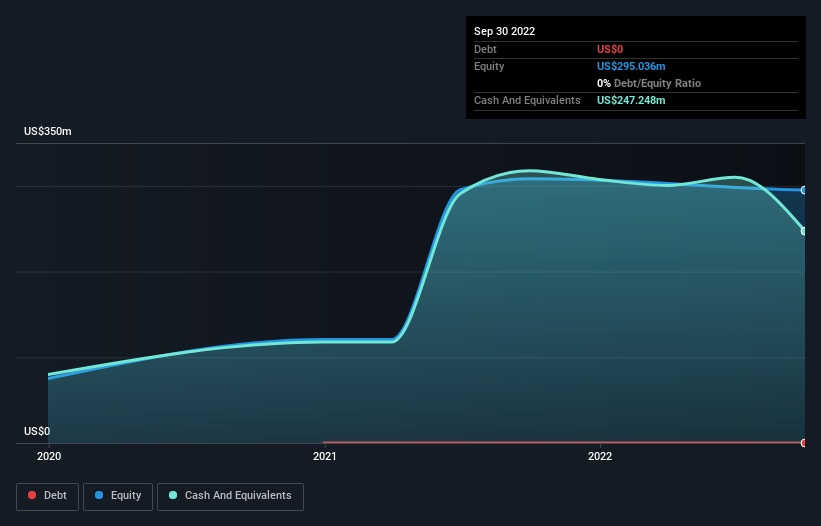Just because a business does not make any money, does not mean that the stock will go down. For example, although software-as-a-service business Salesforce.com lost money for years while it grew recurring revenue, if you held shares since 2005, you'd have done very well indeed. Having said that, unprofitable companies are risky because they could potentially burn through all their cash and become distressed.
So, the natural question for Amplitude (NASDAQ:AMPL) shareholders is whether they should be concerned by its rate of cash burn. In this article, we define cash burn as its annual (negative) free cash flow, which is the amount of money a company spends each year to fund its growth. First, we'll determine its cash runway by comparing its cash burn with its cash reserves.
See our latest analysis for Amplitude
When Might Amplitude Run Out Of Money?
A company's cash runway is calculated by dividing its cash hoard by its cash burn. When Amplitude last reported its balance sheet in September 2022, it had zero debt and cash worth US$247m. Importantly, its cash burn was US$18m over the trailing twelve months. That means it had a cash runway of very many years as of September 2022. Notably, however, analysts think that Amplitude will break even (at a free cash flow level) before then. If that happens, then the length of its cash runway, today, would become a moot point. The image below shows how its cash balance has been changing over the last few years.

How Well Is Amplitude Growing?
We reckon the fact that Amplitude managed to shrink its cash burn by 34% over the last year is rather encouraging. Having said that, the revenue growth of 50% was considerably more inspiring. We think it is growing rather well, upon reflection. While the past is always worth studying, it is the future that matters most of all. So you might want to take a peek at how much the company is expected to grow in the next few years.
How Easily Can Amplitude Raise Cash?
There's no doubt Amplitude seems to be in a fairly good position, when it comes to managing its cash burn, but even if it's only hypothetical, it's always worth asking how easily it could raise more money to fund growth. Issuing new shares, or taking on debt, are the most common ways for a listed company to raise more money for its business. Commonly, a business will sell new shares in itself to raise cash and drive growth. By looking at a company's cash burn relative to its market capitalisation, we gain insight on how much shareholders would be diluted if the company needed to raise enough cash to cover another year's cash burn.
Amplitude has a market capitalisation of US$1.7b and burnt through US$18m last year, which is 1.1% of the company's market value. So it could almost certainly just borrow a little to fund another year's growth, or else easily raise the cash by issuing a few shares.
So, Should We Worry About Amplitude's Cash Burn?
As you can probably tell by now, we're not too worried about Amplitude's cash burn. For example, we think its revenue growth suggests that the company is on a good path. Its cash burn reduction wasn't quite as good, but was still rather encouraging! One real positive is that analysts are forecasting that the company will reach breakeven. Taking all the factors in this report into account, we're not at all worried about its cash burn, as the business appears well capitalized to spend as needs be. Taking a deeper dive, we've spotted 4 warning signs for Amplitude you should be aware of, and 1 of them is concerning.
If you would prefer to check out another company with better fundamentals, then do not miss this free list of interesting companies, that have HIGH return on equity and low debt or this list of stocks which are all forecast to grow.
New: Manage All Your Stock Portfolios in One Place
We've created the ultimate portfolio companion for stock investors, and it's free.
• Connect an unlimited number of Portfolios and see your total in one currency
• Be alerted to new Warning Signs or Risks via email or mobile
• Track the Fair Value of your stocks
Have feedback on this article? Concerned about the content? Get in touch with us directly. Alternatively, email editorial-team (at) simplywallst.com.
This article by Simply Wall St is general in nature. We provide commentary based on historical data and analyst forecasts only using an unbiased methodology and our articles are not intended to be financial advice. It does not constitute a recommendation to buy or sell any stock, and does not take account of your objectives, or your financial situation. We aim to bring you long-term focused analysis driven by fundamental data. Note that our analysis may not factor in the latest price-sensitive company announcements or qualitative material. Simply Wall St has no position in any stocks mentioned.
About NasdaqCM:AMPL
Amplitude
Provides a digital analytics platform that analyzes customer behavior in the United States and internationally.
Flawless balance sheet and undervalued.
Similar Companies
Market Insights
Community Narratives




